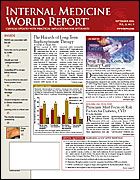Obesity and Menopausal Symptoms: The New Controversy
From the American College of Chemistry
CHICAGO?Physicians naturally urge their overweight and obese patients to lose weight to decrease the well-known excess weight?related risks of diabetes, hypertension, and certain cancers. Little research has shown that being overweight or obese conveys any health benefits. But an endocrinologist who recently spoke at the American College of Chemistry meeting believes that being overweight may reduce the risk of menopausal symptoms in women.
Larry Demurs, PhD, a professor of medicine and pathology at Penn State University, has been investigating the laboratory aspects of women with clinical symptoms of menopause. His research underscores that the synthesis of estrogen in postmenopausal women, mostly estrone, comes from extra-ovarian sources, the adrenal glands.
"Fat tissue is a rich source of aromatase enzymes," said Dr Demurs. Heavier postmenopausal women seem to have higher estrogen levels, most likely due to increased estrone levels. The lower risk of osteoporosis in heavier women compared with thinner women supports this finding.
Women who have a body mass index (BMI) >30 kg/m2 may see other benefits. "There are also reports in the literature of decreased severity of hot flashes and [vaginal] dryness in women who have a BMI greater than 30 compared with a BMI less than 25," said Dr Demurs.
According to this theory, being overweight functions as a natural way of taking estrogen supplements. Of course, the excess estrogen that accompanies excess weight also puts women at greater risk for breast and endometrial cancer.
But a review of the literature on weight and menopausal symptoms, particularly hot flashes, reveals evidence that both supports and refutes Dr Demurs' claim. Some studies have shown that obese women have greater circulating estrone and estradiol levels, because the increased rate of hormone turnover in adipose tissue results in a decreased risk of hot flashes.
Other studies have shown that obese women start to experience decreased estradiol and increased follicle-stimulating hormone levels 4 years earlier than nonobese women, and subsequently experience more hot flashes. Hormone turnover in adipose tissue is also responsible for changes in the severity of symptoms, researchers theorize, but in this case the leptin and tumor necrosis factor produced in fat tissue suppress ovarian steroid production rather than the other way around.
Lisa Gallicchio, PhD, of the Prevention and Research Center at Mercy Medical Center and Johns Hopkins Bloomberg School of Public Health, both in Baltimore, and colleagues studied the relationship between BMI and menopausal symptoms.
Results from 2 studies involving women at midlife shed light on this relationship.
The first?a cross-sectional survey of 1087 women aged 40 to 60 years?showed that "overweight and obese women aged 40 to 50 had an increased risk of hot flashes compared with women with a normal BMI. The association was strongest for women who had a BMI greater than 30. These women were twice as likely to experience hot flashes compared with women with normal BMI." The second study, a cross-sectional analysis of >600 women undergoing menopause, reported similar results.
Dr Gallicchio stated that several large cross-sectional studies from other research groups have found similar results, lending support to an association between BMI and hot flashes. Further-more, these findings suggest that weight-loss interventions rather than weight gain may help prevent and manage hot flashes in women who are undergoing menopause.
Ellen B. Gold, PhD, chief of epidemiology, University of California Los Angeles School of Medicine, recently completed a study of 3198 perimenopausal women from diverse ethnic backgrounds who were followed for 6 years. The results refute Dr Demurs' claims. "With increased BMI, there were increased menopausal symptoms," Dr Gold stated.
It remains to be determined whether and why being overweight or obese would decrease or increase menopausal symptoms, but Dr Gold offers her suggestion. "Perhaps the insulation from additional body fat holds in the heat," she says.
